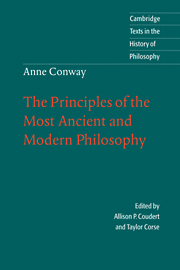Book contents
- Frontmatter
- Contents
- Acknowledgments
- Introduction
- Chronology
- Further reading
- Note on the text
- The Principles of the Most Ancient and Modern Philosophy
- Unpublished Preface by Henry More
- Published Preface
- Chapter I
- Chapter II
- Chapter III
- Chapter IV
- Chapter V
- Chapter VI
- Chapter VII
- Chapter VIII
- Chapter IX
- Index
- Cambridge Texts in the History of Philosophy
Introduction
Published online by Cambridge University Press: 18 November 2009
- Frontmatter
- Contents
- Acknowledgments
- Introduction
- Chronology
- Further reading
- Note on the text
- The Principles of the Most Ancient and Modern Philosophy
- Unpublished Preface by Henry More
- Published Preface
- Chapter I
- Chapter II
- Chapter III
- Chapter IV
- Chapter V
- Chapter VI
- Chapter VII
- Chapter VIII
- Chapter IX
- Index
- Cambridge Texts in the History of Philosophy
Summary
Anne Conway was a extraordinary figure in a remarkable age. She was all the more extraordinary because of her achievements as a woman living during an intensely patriarchal century, when women's opportunities were severely restricted and their roles limited to that of wife and mother. Anne Conway's accomplishments as a student of philosophy and theology, her mastery of the intricate doctrines of the Lurianic Kabbalah, and her authorship of a treatise criticizing Descartes, Hobbes, and Spinoza wildly exceeded the capacities of all but a tiny fraction of her female contemporaries. Her radical, indeed scandalous, conversion to the despised sect of Quakers further revealed an independence of mind wholly unexpected (and unwanted) in women at the time.
Anne Finch (Lady Conway's maiden name) was born into one distinguished family and married into another. Her father, Sir Heneage Finch, had a distinguished political career as Sergeant-at-Law, Recorder of the City of London, and Speaker of the House of Commons. He died a week before Anne's birth on 14 December 1631, leaving her mother (his second wife), Elizabeth Cradock Bennett, twice widowed, with nine stepchildren in addition to her own offspring. The eldest of Anne's stepbrothers, also named Heneage, followed in his father's footsteps and was appointed to the high political offices of Solicitor General, Attorney General, Lord Keeper of the Great Seal, and Lord High Chancellor. In 1681 he was created Earl of Nottingham.
As was customary for girls, Anne Finch received no formal education.
- Type
- Chapter
- Information
- Anne Conway: The Principles of the Most Ancient and Modern Philosophy , pp. vii - xxxiiiPublisher: Cambridge University PressPrint publication year: 1996

